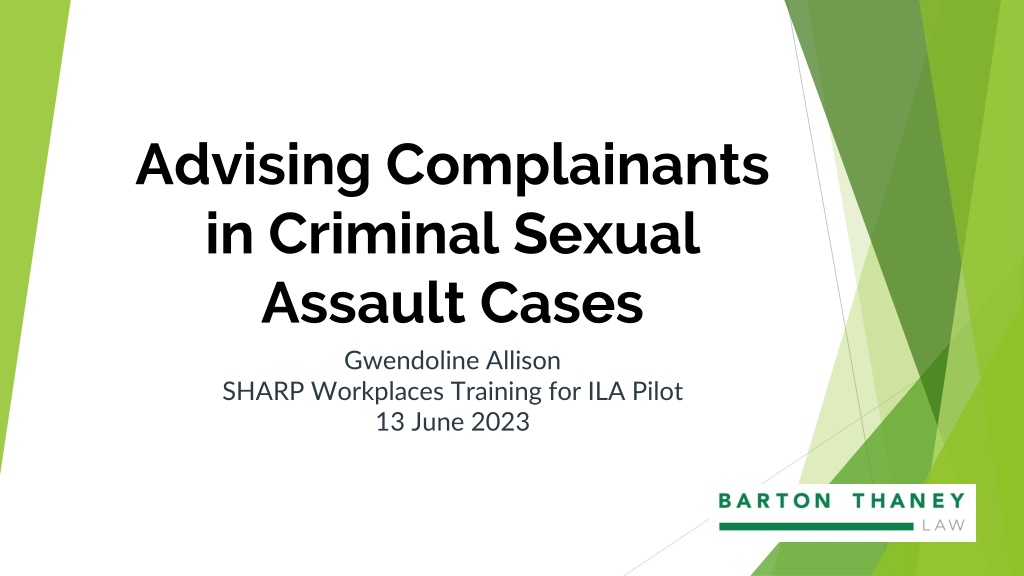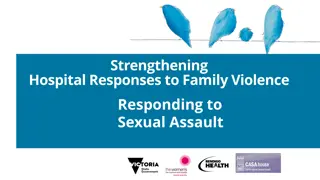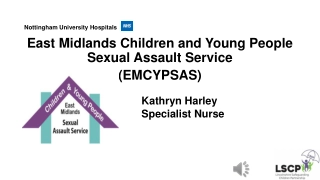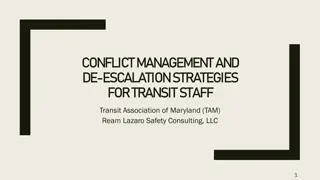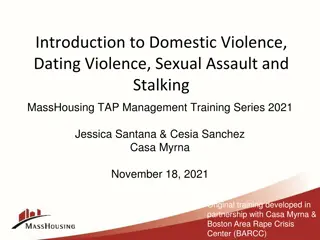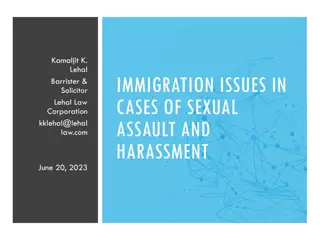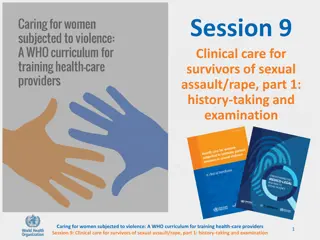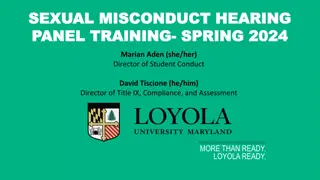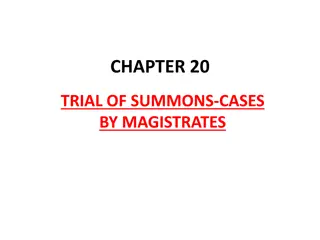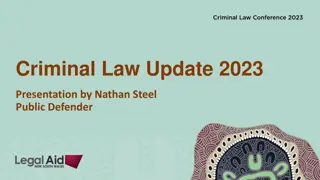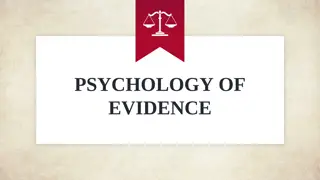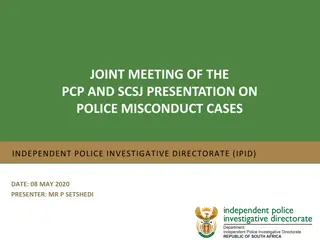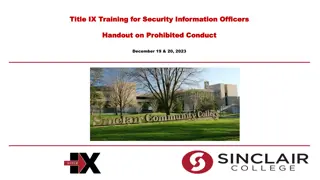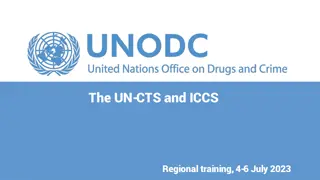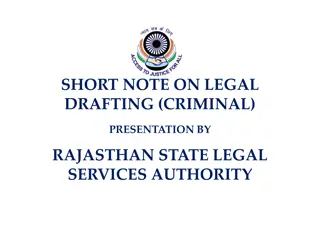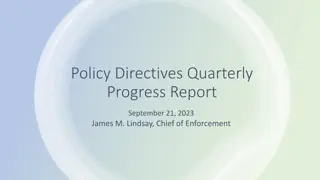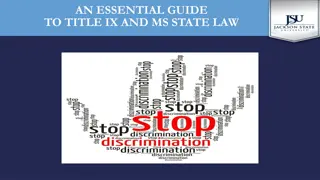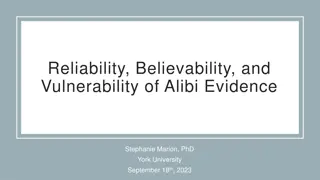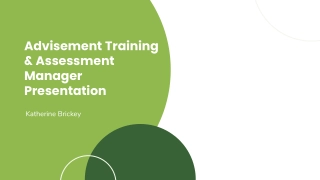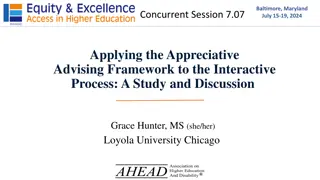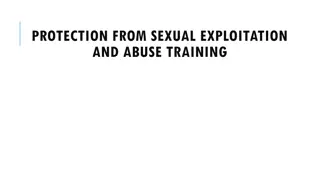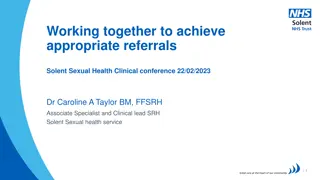Advising Complainants in Criminal Sexual Assault Cases
The essential aspects of advising complainants in criminal sexual assault cases, including their role, barriers, legal advice, and pre-trial applications. It emphasizes the importance of ethical considerations, the role of complainant's counsel, and navigating key legal procedures. The presentation stresses that it is for training purposes and not legal advice.
Download Presentation

Please find below an Image/Link to download the presentation.
The content on the website is provided AS IS for your information and personal use only. It may not be sold, licensed, or shared on other websites without obtaining consent from the author. Download presentation by click this link. If you encounter any issues during the download, it is possible that the publisher has removed the file from their server.
E N D
Presentation Transcript
Advising Complainants in Criminal Sexual Assault Cases Gwendoline Allison SHARP Workplaces Training for ILA Pilot 13 June 2023
The Plan Introductory comments Role of complainants in criminal sexual assault cases Barriers to advising complainants Independent legal advice Introduction to pre-trial applications: Production of records from third parties (section 278.3) Admission of other sexual activity evidence (section 276) Admission of records in the hands of the accused (section 278.92)
The Plan (Continued) Common considerations The role of complainant s counsel Ethical considerations Publication bans In camera hearing Applications for production of records Applications to admit other sexual activity evidence Applications to admit records in the possession of the accused
Before we begin This presentation is strictly for training purposes. It is not legal advice and it should not be used in any way as legal advice. My comments are my personal comments and are not to be construed as being made on behalf of any organization.
Introduction: Role of Complainants in Criminal Sexual Assault Cases Complainants are witnesses. Complainants are not parties. They are not represented by the Crown. There is no solicitor/client privilege between the Crown and the complainant. Complainants should expect that what they tell the Crown will be disclosed to the accused.
Introduction: Role of the Crown R. v. Boucher, [1955] S.C.R. 16, at p. 23-24: It cannot be over-emphasized that the purpose of a criminal prosecution is not to obtain a conviction, it is to lay before a jury what the Crown considers to be credible evidence relevant to what is alleged to be a crime. Counsel have a duty to see that all available legal proof of the facts is presented: it should be done firmly and pressed to its legitimate strength but it must also be done fairly. The role of prosecutor excludes any notion of winning or losing; his function is a matter of public duty than which in civil life there can be none charged with greater personal responsibility. It is to be efficiently performed with an ingrained sense of the dignity, the seriousness and the justness of judicial proceedings.
Introduction: Role of the Crown (Disclosure) The Crown has a positive duty to disclose any evidence that might be relevant to the defence unless that evidence is protected by privilege or is clearly irrelevant: R. v. Stinchcombe, [1995] 1 S.C.R. 754.
Introduction: Giving General Advice to Complainants There is no prohibition on complainants obtaining their own legal advice, at any stage, but There are barriers: Money no public funding (there are some exceptions) Expertise who would provide the advice? Imperfect knowledge of the case Potential interference with the Crown s obligations Perception questions about interference with evidence Alternatives to lawyers Victim Services/rape crisis centres
Independent Legal Advice On occasion, Legal Aid BC will provide funding for a complainant to receive ILA. The need for ILA arises when the complainant has disclosed documents to the police, or the police are asking the complainant to produce records. The Crown wishes to be assured that the complainant understands what could happen if the complainant provides the documents.
Independent Legal Advice (continued) ILA includes explaining to the complainant: That the complainant has a privacy interest in the documents; If the complainant produces the documents, the Crown will disclose the documents to the accused; The Crown may wish to use the documents in the prosecution of the case; The accused may wish to use the documents to undermine the complainant s evidence. The goal is for the complainant s consent to be informed.
Introduction to Pre-Trial Applications Production of records from third parties: 278.2 (1) Except in accordance with sections 278.3 to 278.91, no record relating to a complainant or a witness shall be produced to an accused in any proceedings in respect of any of the following offences or in any proceedings in respect of two or more offences at least one of which is any of the following offences: (a) an offence under section 151, 152, 153, 153.1, 155, 160, 170, 171, 172, 173, 213, 271, 272, 273, 279.01, 279.011, 279.02, 279.03, 286.1, 286.2 or 286.3; or (b) any offence under this Act, as it read from time to time before the day on which this paragraph comes into force, if the conduct alleged would be an offence referred to in paragraph (a) if it occurred on or after that day. * * * 278.3 (1) An accused who seeks production of a record referred to in subsection 278.2(1) must make an application to the judge before whom the accused is to be, or is being, tried.
Introduction to Pre-Trial Applications Admission of other sexual activity evidence: 276 (1) In proceedings in respect of an offence under section 151, 152, 153, 153.1 or 155, subsection 160(2) or (3) or section 170, 171, 172, 173, 271, 272 or 273, evidence that the complainant has engaged in sexual activity, whether with the accused or with any other person, is not admissible to support an inference that, by reason of the sexual nature of that activity, the complainant (a) is more likely to have consented to the sexual activity that forms the subject-matter of the charge; or (b) is less worthy of belief. I will address the test of admitting evidence later.
Introduction to Pre-Trial Applications Applications to admit records in the hands of the accused: 278.92 (1) Except in accordance with this section, no record relating to a complainant that is in the possession or control of the accused and which the accused intends to adduce shall be admitted in evidence in any proceedings in respect of any of the following offences or in any proceedings in respect of two or more offences at least one of which is any of the following offences: (a) an offence under section 151, 152, 153, 153.1, 155, 160, 170, 171, 172, 173, 213, 271, 272, 273, 279.01, 279.011, 279.02, 279.03, 286.1, 286.2 or 286.3; or (b) any offence under this Act, as it read from time to time before the day on which this paragraph comes into force, if the conduct alleged would be an offence referred to in paragraph (a) if it occurred on or after that day. I will address the test of admitting evidence later.
What is a Record? 278.1 For the purposes of sections 278.2 to 278.92, record means any form of record that contains personal information for which there is a reasonable expectation of privacy and includes medical, psychiatric, therapeutic, counselling, education, employment, child welfare, adoption and social services records, personal journals and diaries, and records containing personal information the production or disclosure of which is protected by any other Act of Parliament or a provincial legislature, but does not include records made by persons responsible for the investigation or prosecution of the offence.
What is a Record (continued)? The general types: The enumerated examples records kept by third parties and personal journals/diaries maintained by the complainant; Texts, emails and/or messages between the complainant and the accused or third parties, photographs, certain social media posts, in which the complainant may have a reasonable expectation of privacy.
Pre-trial Applications: Common Considerations https://www.westcoastleaf.org/wp- content/uploads/2020/04/lower-res-Complainant-Counsel- Toolkit-Nov-2022-update-web.pdf The toolkit provides an introduction to the law, and advice on how to approach contact with complainants (counsel does not have a lot of time to establish a relationship with complainants).
What is the Point? Sexual assault is still among the most highly gendered and underreported crimes. The harms associated with sexual assault are vast. There remains a need to remove discriminatory myths and stereotypes from sexual assault trials, as issues of equality and trial fairness. The harm caused by sexual assault, and society s biased reactions to that harm, are not relics of a bygone Victorian era : R. v. Goldfinch, 2019 SCC 38, para. 37
The Twin Myths That because of a complainant s sexual activity, she is: More likely to have consented to the charged conduct; or She is less worthy of belief.
Other Damaging Myths and Stereotypes Women who have been sexually assaulted deserve it; Women are unreliable witnesses; Women lie about sexual assault; Women allege sexual assault to get back in the good graces of those who may have her sexual conduct under scrutiny; Women will avoid those who sexually assault them; Women will report a sexual assault immediately afterwards; Sexual assault is committed by strangers.
The Role of Complainants Counsel The complainant is not a compellable witness but may appear and make submissions: sections 278.4(1) and 278.94(2); R. v. J.J., 2020 SCC 28, paras. 99-102 There is little judicial guidance on the content of a complainant s submissions. There is a general expectation that the complainant s submission will focus on the complainant s privacy, security and equality interests. It is questionable whether the complainant may make submissions on the sufficiency of the application and the requirement to set out a defence.
The Role of Complainants Counsel (continued) The complainant is entitled to make submissions on relevance. The complainant is not entitled to cross-examine any witnesses. The complainant is not entitled to tender evidence. The role of the complainant does not extend to the trial itself. Attendance at trial, however, may become necessary.
The Scope of the Retainer The retainer is limited. The role is limited to the application and is not the role of a second prosecutor. Counsel do not advise on the trial. Legal Aid BC pays (at their rate) for 10 hours of preparation and 20 hours of court time. It is sometimes possible to obtain an increase. Travel time is generally not paid, although travel disbursements are paid. There are permitted disbursements for copying. Different clients have differing needs for time, depending on their emotional bandwith and other vulnerabilities.
Ethical Considerations Solicitor/client privilege exists between the complainant and counsel. Without the consent of the complainant, counsel cannot discuss issues with Crown. Counsel s duty is to act in the complainant s best interest. The complainant s goals, generally, are: Get onto trial ASAP; Ensure the trial is as fair as possible. The complainant s interests are not always aligned with the Crown. The disclosure of application materials is an issue that requires careful consideration.
Ethical Considerations (Continued) Counsel cannot (or should not) agree to accept materials until they have discussed the application with the complainant. Counsel requires instructions from the complainant not to share the application materials with the complainant. Without those instructions, complainant s counsel may have an ethical obligation to share the materials. Consequently, it is optimal for Crown and complainant s counsel to speak before disclosing the materials.
Publication Ban There is usually a publication ban on the identity of the complainant: section 486. The pre-trial applications also have their own separate publication bans: sections 278.9(1) and 278.95(1), which includes: The contents of the application; The evidence and submissions at the hearing; and the decision. I will describe the publication ban in more detail below.
The Hearing of the Application The application must be heard by the trial judge. The hearing will be in camera: The public are excluded from the court room; The court room will be locked. If in the BCSC, lawyers will be gowned. The complainant may be entitled to attend: I would question whether that is in the complainant s best interest; The judge may exclude the complainant.
Applications for the Production of Records: Sections 278.3-278.91 The accused must serve the application materials on the Crown, the complainant, the records holder and anyone who might have an interest in the records. The application should be brought at least 60 days before trial, but the judge may waive the time limit.
Applications for the Production of Records: Sections 278.3-278.91 Two stage test. At the first stage, the records are not disclosed. At the first stage, the accused must show The record is likely relevant to an issue at trial or the competence of a witness to testify. The production of the record is necessary in the interests of justice. Salutary and deleterious effects . Right to make full answer and defence Right to privacy and equality of the complainant or witness and any other person to whom the record relates.
The Bare Assertions: section 278.3(4) In showing likely relevance , the accused must be able to point to case- specific evidence. The following grounds on their own are not sufficient: (a) that the record exists; (b) that the record relates to medical or psychiatric treatment, therapy or counselling that the complainant or witness has received or is receiving; (c) that the record relates to the incident that is the subject-matter of the proceedings; (d) that the record may disclose a prior inconsistent statement of the complainant or witness; ( e) that the record may relate to the credibility of the complainant or witness;
The Bare Assertions (continued). The following grounds on their own are not sufficient: (f) that the record may relate to the reliability of the testimony of the complainant or witness merely because the complainant or witness has received or is receiving psychiatric treatment, therapy or counselling; (g) that the record may reveal allegations of sexual abuse of the complainant by a person other than the accused; (h) that the record relates to the sexual activity of the complainant with any person, including the accused; (i) that the record relates to the presence or absence of a recent complaint; (j) that the record relates to the complainant s sexual reputation; or (k) that the record was made close in time to a complaint or to the activity that forms the subject-matter of the charge against the accused.
Factors the Court Must Consider: Section 278.5(2) The accused s right to make full answer and defence ; The probative value of the record; The nature and extent of the reasonable expectation of privacy; The existence of any discriminatory belief or bias ; The potential prejudice to personal dignity and right to privacy of any person to whom the record relates; Society s interest in encouraging reporting of sexual offences; Society s interest in encouraging complainants to seek treatment ; The effect on the integrity of the trial.
Stage Two: Sections 278.6 and 278.7 If the accused succeeds at stage one, the court will order disclosure of the records to the judge. The judge will review the records in the absence of the parties. The judge will apply the same factors as in stage one. The judge may hold a further hearing. After stage two, the court may order production to the accused.
Applications to Admit Other Sexual Activity Evidence: sections 276 and 278.93 There is an absolute prohibition on evidence of other sexual activity that is being adduced for the purposes of drawing the inference that because of the other sexual activity, the complainant is: More likely to have consented or Is less worthy of belief (the twin myths ). Other sexual activity evidence that is sought to be adduced for other purposes is presumptively inadmissible, except with permission of the judge.
Applications to Admit Other Sexual Activity Evidence: sections 276 and 278.93 The application must be brought at least seven days before trial, but the judge may waive the time limit. Two Stage test. At stage one, the complainant has no standing. At stage one, the accused must show that the evidence is capable of being admitted for a purpose other than the twin myths.
Applications to Admit Other Sexual Activity Evidence: sections 276 and 278.93 At stage two, the accused must establish that the evidence is not being adduced for the purpose of supporting an inference that the complainant is more likely to have consented to the sexual activity in question, or is less worthy of belief; is of specific incidents of sexual activity; is relevant to an issue at trial; and has specific probative value that is not substantially outweighed by the danger of prejudice to the proper administration of justice.
Factors the Court Must Consider: section 276(3) The interests of justice, including the right of the accused to make a full answer and defence; Society s interest in encouraging the reporting of sexual assault offences; Whether there is a reasonable prospect that the evidence will assist in arriving at a just determination in the case; The need to remove from the fact-finding process any discriminatory belief or bias; The risk that the evidence may unduly arouse sentiments of prejudice, sympathy or hostility in the jury; The potential prejudice to the complainant s personal dignity and right of privacy; The right of the complainant and of every individual to personal security and to the full protection and benefit of the law; and Any other factor that the judge, provincial court judge or justice considers relevant.
Other Considerations If the court allows other sexual activity evidence to be adduced at trial, the court must consider the purpose for which the evidence is being adduced. The court may impose conditions upon the use, and direct how questions may be asked. Complainant s counsel may be asked to participate in fashioning questions. The application may be renewed during the trial.
Applications to Admit Records: Sections 278.92-278.9 The application must be brought at least seven days before trial, but the judge may waive the time limit. Two Stage test. At stage one, the complainant has no standing. At stage one, the accused must show that the evidence is capable of being admitted for a purpose other than the twin myths; and that a hearing should proceed.
Applications to Admit Records: Sections 278.92-278.9 The evidence is inadmissible unless the judge, provincial court judge or justice determines, in accordance with the procedures set out in sections 278.93 and 278.94, if the admissibility of the evidence is subject to section 276, that the evidence meets the conditions set out in subsection 276(2) while taking into account the factors set out in subsection (3); or in any other case, that the evidence is relevant to an issue at trial and has significant probative value that is not substantially outweighed by the danger of prejudice to the proper administration of justice.
Factors the Court Must Consider: Section 278.92(3) The interests of justice, including the right of the accused to make a full answer and defence; Society s interest in encouraging the reporting of sexual assault offences; Society s interest in encouraging the obtaining of treatment by complainants of sexual offences; Whether there is a reasonable prospect that the evidence will assist in arriving at a just determination in the case; The need to remove from the fact-finding process any discriminatory belief or bias; The risk that the evidence may unduly arouse sentiments of prejudice, sympathy or hostility in the jury; The potential prejudice to the complainant s personal dignity and right of privacy; The right of the complainant and of every individual to personal security and to the full protection and benefit of the law; and Any other factor that the judge, provincial court judge or justice considers relevant.
The Publication Ban in Applications to Admit Evidence: Section 278.95(1) 278.95 (1) A person shall not publish in any document, or broadcast or transmit in any way, any of the following: (a) the contents of an application made under subsection 278.93; (b) any evidence taken, the information given and the representations made at an application under section 278.93 or at a hearing under section 278.94; (c) the decision of a judge or justice under subsection 278.93(4), unless the judge or justice, after taking into account the complainant s right of privacy and the interests of justice, orders that the decision may be published, broadcast or transmitted; and (d) the determination made and the reasons provided under subsection 278.94(4), unless (i) that determination is that evidence is admissible, or (ii) the judge or justice, after taking into account the complainant s right of privacy and the interests of justice, orders that the determination and reasons may be published, broadcast or transmitted.
Questions? Gwendoline Allison Barton Thaney Law gwendoline.allison@bartonthaney.com 604.922.9282 778.919.6173
Advising Complainants in Criminal Sexual Assault Cases Gwendoline Allison SHARP Workplaces Training for ILA Pilot 13 June 2023
